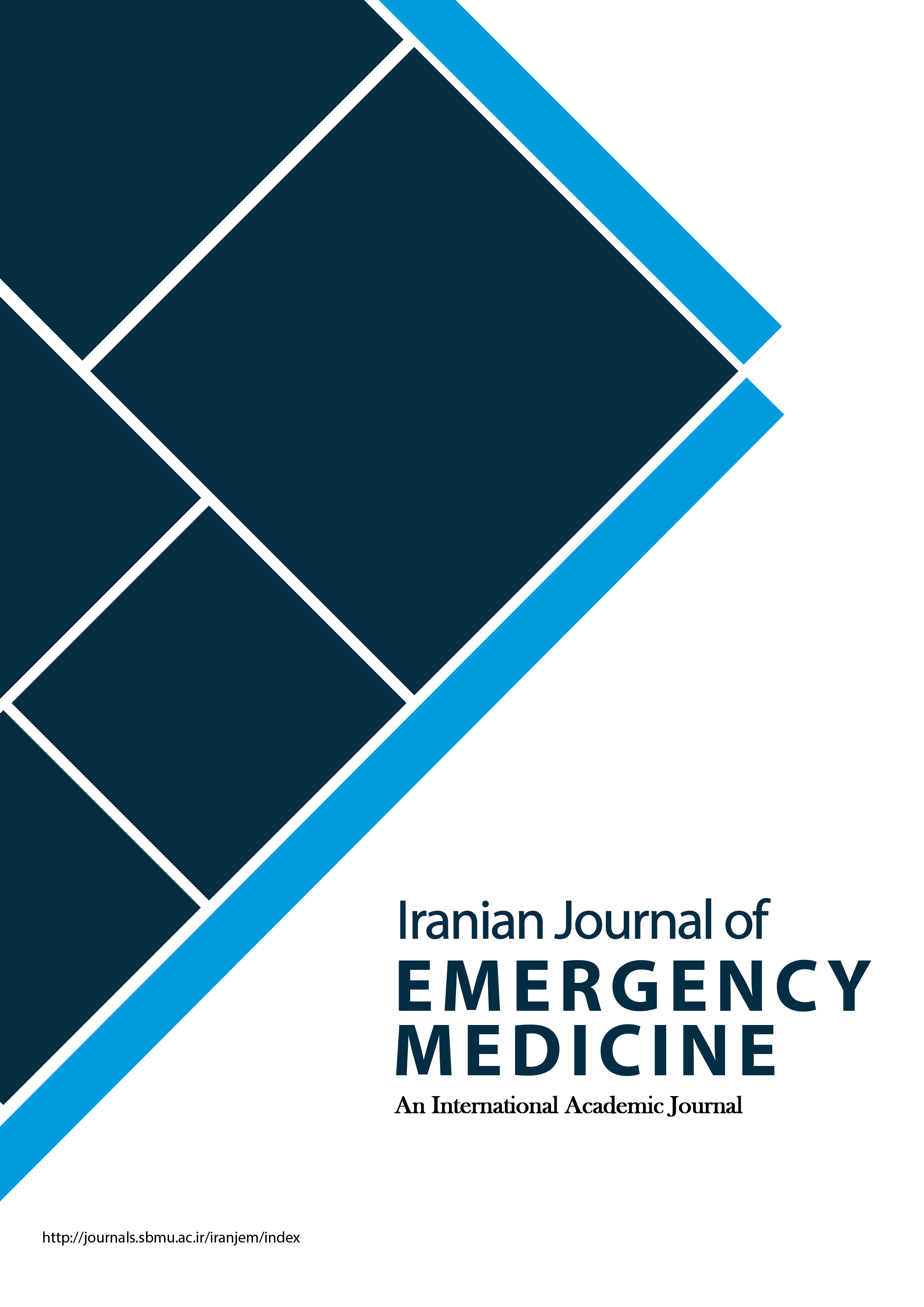The Effect of Education on the Knowledge and Practice of Emergency Department’s Nurses Regarding the Patients’ Triage
Iranian Journal of Emergency Medicine,
Vol. 1 No. 1 (2014),
6 August 2014
,
Page 40-44
https://doi.org/10.22037/ijem.v1i1.7274
Abstract
Introduction: Emergency department as one of the most important wards of the hospital confronts with lots of referring patients. Timely service presentation in this ward depends on efficient and effective functions of its personnel. Thus, this study was aimed to evaluate the effect of education on the knowledge and practice of emergency department’s nurses in the patients’ triage field. Methods: In this cross-sectional study, the knowledge and practice of 50 nurses was evaluated before and after of 9 hours educational workshop regarding patients’ triage based on the emergency severity index (ESI). Persons who had at least six months work experience in the emergency department and did not participate in any triage workshop during the six years before starting the project were entered to the study. Data gathering was performed through preparing three questionnaires separately included demographic information as well as assessment of knowledge and practice. Evaluated demographic characteristics were age, gender, marital status, work history, academic degree, type of employment, work shift, and average of work shift weekly. To assess the knowledge and practice, two separate questionnaires were used that their reliability and validity were confirmed before. Data was analyzed using SPSS 16 and appropriate analytic tests. P<0.05 was considered as statistically significant. Results: The average knowledge scores of nurses reached from 7.5±2.1 to 14±1.6 (p= 0.001, r=0.49) after education. Also the average scores of participants increased from 31.8±9.9 to 69.7±8.1 (p= 0.001, r=0.87). There was no significant relationship between characteristics of nurses and their knowledge scores in six weeks after education (p>0.05). While it was seen between the work history of nursing (p=0.038), working in emergency department (p=0.001), as well as type of employment (p=0.019) and average scores of practice within six weeks after education. No significant relation was seen between academic degree, marital status, and gender of participants and average scores of knowledge and practice during six weeks after finishing the educational workshop. Conclusion: It seems that education has a positive effect on increasing the knowledge and practice of emergency department’s nurses regarding the triage of patients by ESI. Therefore, expanding the theoretical and practical courses of education is essential to improve the knowledge and quality of service presentation.- پژوهش در آموزش پرستاری؛ نگرش، عملکرد؛ تریاژ؛ طب اورژانس
How to Cite
References
Omidvari S, Shahidzadeh A, Montazeri A, et al. Patient satisfaction with emergency departments. Payesh. 2008;7(2):141-52 [Persion].
Shahrami A, Rahmati F, Kariman H, et al. Utilization of Failure Mode and Effects Analysis (FMEA) Method in Increasing the Revenue of Emergency Department; a Prospective Cohort Study. Emergency. 2013;1(1): 1-6.
Soleimanpour H, Gholipouri C, Salarilak S, et al. Emergency department patient satisfaction survey in Imam Reza Hospital, Tabriz, Iran. Int J Emerg Med. 2011;4(1):2.
Hashemi B, Baratloo A, Rahmati F, et al. Emergency Department Performance Indexes Before and After Establishment of Emergency Medicine. Emergency. 2013;1(1): 20-3.
Esmailian M, Zamani M, Azadi F, Ghasemi F. Inter-Rater Agreement of Emergency Nurses and Physicians in Emergency Severity Index (ESI) Triage. Emergency. 2014;2(4):158-61.
Kariman H, Joorabian J, Shahrami A, Alimohammadi H, Noori Z, Safari S. Accuracy of emergency severity index of triage in Imam Hossein hospital - Tehran, Iran (2011). Journal of Gorgan University of Medical Sciences. 2013;15(1):115-9 [persian].
Dalwai MK, Twomey M, Maikere J, et al. Reliability and accuracy of the South African Triage Scale when used by nurses in the emergency department of Timergara Hospital, Pakistan. South African Medical Journal. 2014;104(5):372-5.
Marconi GP, Chang T, Pham PK, Grajower DN, Nager AL. Traditional nurse triage vs physician telepresence in a pediatric ED. The American journal of emergency medicine. 2014;32(4):325-9.
Gerdtz MF, Bucknall TK. Triage nurses’ clinical decision making. An observational study of urgency assessment. Journal of Advanced Nursing. 2001;35(4):550-61.
Haghdoust Z, Safavi M, Yahyavi H. Effect of Triage Education on knowledge, attitude and practice of nurses in Poursina Educational and Therapeutic Emergency center in Rasht. The Journal Of Nursing And Midwifery Faculties Guilan Medical University. 2010:14-21 [persian].
Taheri N, Kohan S, Haghdoost A, Foroogh AG. Assessment of knowledge and activity of nurses in triage field in hospitals of Kerman University of Medical Sciences, 2005. [Persian]: Kerman University of Medical Sciences
AH M, M R. A Survey on Knowledge Level of the Nurses about Hospital Triage. Iranian Journal of Critical Care Nursing. 2011;3(1):167-74.
Lugt‐Lustig KH, Vanobbergen JN, Putten GJ, Visschere LM, Schols JM, Baat C. Effect of oral healthcare education on knowledge, attitude and skills of care home nurses: a systematic literature review. Community dentistry and oral epidemiology. 2014;42(1):88-96.
Betz ME, Sullivan AF, Manton AP, et al. Knowledge, attitudes, and practices of emergency department providers in the care of suicidal patients. Depression and anxiety. 2013;30(10):1005-12.
Mousavi F, Tavabi A, Golestan B, et al. Knowledge, attitude and practice towards blood donation in Iranian population. Transfusion Medicine. 2011;21(5):308-17.
- Abstract Viewed: 858 times
- پی دی اف (فارسی) Downloaded: 3792 times
- HTML (فارسی) Downloaded: 195 times



